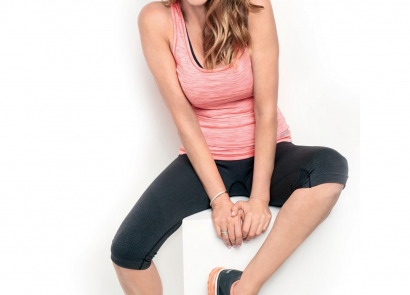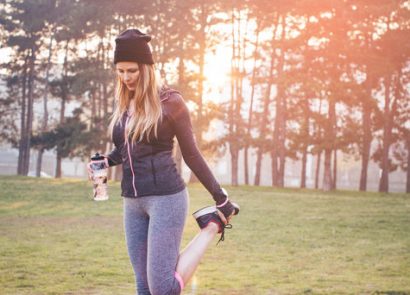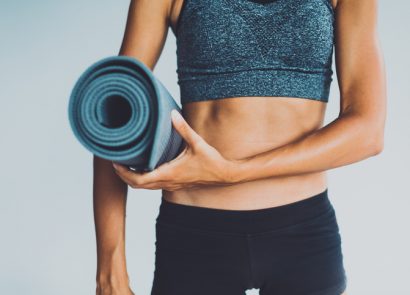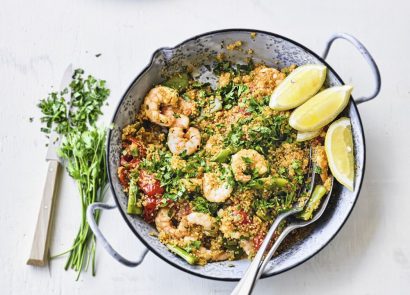7.30am: Switch your fry up for a bowl of muesli
If you want strong joints and cartilage, calcium is the number one mineral to get into your diet. Swap a salty cooked breakfast for muesli, chopped almonds, seeds, natural yoghurt and berries, suggests nutritionist Emma Scott (nutrilife.uk.com).
“Too much sodium can affect your calcium balance by eliminating it from your body in significant proportions,” says Scott. “Studies show that for each additional gram of sodium eaten per day, bone loss in women is increased by one percent per year. As we age, this becomes even more important because we absorb less dietary calcium.”
9am: Walk to work
Exercise is the key to good bone health. In fact, a National Osteoporosis Society study of 61,000 postmenopausal women showed those who walked for four hours or more per week had a 41 percent lower risk of hip fractures than those who walked for less than one hour. If you can’t walk to work, try parking further away so you can get a quick stroll in.
Getting outdoors will also help you absorb more vitamin D. “This is critical to bone-building because it improves absorption of calcium from the gut, helps increase bone density and enhances muscle function, reducing the risk of falls and fractures,” says Scott. “15 minutes in the sunshine is all you need.”
10am: Try a coffee-break core crunch
Core strength also plays a role in bone health by reducing the risk of spinal injury, enhancing posture and improving balance. So while you’re waiting for the kettle to boil, try PT Anna Reich’s (annareichpt.co.uk) quick core workout:
- Stand up and tighten your core. Pull your belly button backwards and hold it while you breathe in and out. Be mindful you’re pulling backwards, rather than ‘up’.
- Put your hands together as if you’re praying, then link your fingers together.
- Holding your core in, and not moving your legs, twist left then right, and right then left, but try to resist the movement with your core.
12.30pm Grab a potassium pumping lunch
Add a portion of potassium-rich fruits and vegetables to your lunchtime menu and you’ll help enhance stores of bone-building calcium. “Studies show diets abundant in potassium reduce the need for calcium to be mobilised from your bones,” says Scott. “And research from the University of Surrey also suggests that potassium salts reduce bone ‘resorption’, the process by which bone is broken down. Try boiled eggs with a spinach and avocado salad, sprinkled with lentils, olives and seeds.”
2pm Take the stairs
“Most forms of exercise have been shown to stimulate maintenance and improvement in bone density through ‘loading’ i.e. applying a stress factor to the body, but bodyweight only exercises, such as push ups and step ups have been shown to be more effective for bone fitness than aerobic exercise. The bones ‘feel’ this and react by becoming stronger,” says Reich. “Incorporate step ups into your working day by taking two or three steps at a time on the way up the stairs and jump the last two your way down. Taking greater strides means greater resistance for your bones as you push forward. The jumping part creates impact for your bones to deal with.”
3.30pm Swap your skinny mocha for a smoothie
Rather than reaching for your usual coffee and cake, try Emma Scott’s top three bone boosting nibbles:
1. Ginger Blast Green Smoothie:
Simply blend 1 banana, 1 orange,1/2 lime, 1tsp chia seeds, 2cm fresh ginger, 70g kale and 225ml coconut water together. “Boost your vitamin K levels by adding lots of leafy greens to your daily diet through a smoothie such as this one. This bone-related micronutrient is essential for the functioning of specific enzymes and regulators, which are needed to assist in the formation of an optimal honeycomb-structured bone matrix.”
2. Banana with almond butter on oatcakes:
“This snack is packed with protein, which research suggests may play a pivotal role in maintenance of bone health by increasing calcium absorption, muscle strength and mass, all of which could potentially benefit the skeleton.”
3. Soft goat’s cheese and artichoke dip with red pepper sticks:
“Vitamin C is a powerful antioxidant that has a positive effect on bone formation by influencing the expression of bone matrix genes. Studies suggest it stimulates the production of bone-forming cells and may help to protect bone cells from damage.”
6.30pm Shop-lift
Can’t get to the gym? Turn a shopping trip into a super workout by bicep-curling your groceries instead. As we age, bone tissue loss increases and at a quicker rate than we can build new bone, but weight lifting can counteract these effects by remodelling bone and stimulating ‘osteoblasts’ – the cells that help build bones. Try three rounds of eight to 12 reps with a slow tempo.
7pm Bulk up your dinner
Several studies have shown that fibre can pump up your bone health. In particular, research from the Freidrich-Alexander University in Germany suggests fatty acids produced when the gut breaks down fibre rich foods could protect against rheumatoid arthritis.
“Prebiotic fibres boost microbial fermentation in the gut, which leads to an increased production of short-chain fatty acids, and these have been linked with increased calcium absorption and increased bone density and strength,” adds Scott. “More recent research suggests that increasing dietary fibres may help to improve calcium absorption by stimulating the gut microbiome too.”
8.30pm Treat yourself to a tipple
While heavy drinking is associated with bone thinning, one to two small wines or beers after work could actually be doing your bones some good! Several studies have shown women who drink 19g of alcohol a day (around two small glasses of wine) have improved bone mineral density and strength. Dietary silicon in beer may also play an important role in bone growth and development, with some studies suggesting it might help fight osteoporosis. In comparison, say the studies, abstaining from alcohol altogether could lead to a higher risk of developing osteoporosis.
11pm Get more ZZZs
Lying down might not the most obvious way to boost your bone health, but several studies have suggested people who get less than six hours kip per night could have a higher risk of osteoporosis. It’s thought the lack of sleep may effect bone metabolism and impact how our bones repair themselves.




















